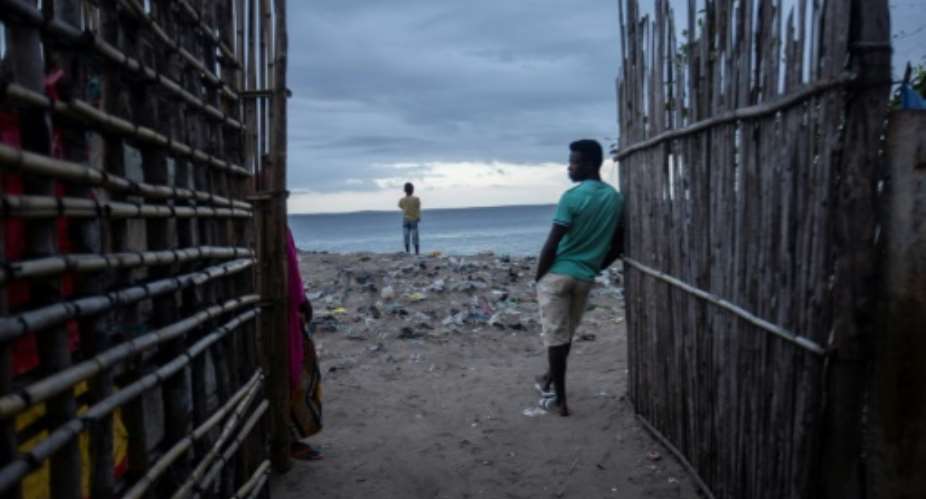The battle of Palma, which fell to jihadists terrorising northern Mozambique, marks a turning point in the three-year Islamist insurgency that has already cut off swathes of the vast southern African country.
Heavily armed militants raided the coastal town last week, killing dozens in days of fighting and forcing thousands to flee by boat and road, including foreign gas workers, in one of Mozambique's bloodiest jihadist assaults.
The attack -- just 10 kilometres from a major gas plant -- brought the militants to the door step of the largest foreign direct investment project seen in Africa in recent years.
The sophisticated attack also further exposed the impotence of the Mozambique government's already outgunned security forces in curbing a militancy once seen as a disorganised, ragtag group.
Mozambique's northernmost province of Cabo Delgado, which borders with Tanzania, has been ravaged by the insurgency since October 2107.
In its infancy, the insurgency began with sporadic, small-scale attacks targeting police stations and then moved to burning villages and beheading civilians in rural and remote areas.
But last year, the militants escalated their campaign -- seizing a key port of Mocimboa da Praia, where the group first emerged three-and-half years ago.
Last week, after a nearly three-month relative lull, fighting erupted in a well-coordinated attack and for the first time directly touched expatriates working in Palma.
That marked a major shift in the crisis, especially coming after the government assured energy operators of full security within a 25 km radius of the plant to develop liquified natural gas or LNG.
Even before Palma, security concerns caused setbacks to the project's development.
"It has raised the profile of the violent extremists," said Adriano Nuvungo, head of the Maputo-based Centre for Democracy and Development.
"Internationally they are showing that they can significantly impact the calendar of the LNG project".
'Gaining momentum'
From their roots as armed gangs of frustrated youths branded mere criminals by government, they have morphed into a group now listed as an IS-linked terrorist organisation by the US State Department.
"It is an insurgency that is gaining momentum,... yet another message of how sophisticated they are becoming," said South African-based expert on terrorism Jasmine Opperman.
The attack was "an evolutionary process, a refinement in guerrila warfare that has not been at play previously," Opperman said.
The new scale of violence poses an unprecedented threat to the gas project into which French energy giant Total has pumped billions of dollars.
That Total, which suspended operations in January due to insecurity, said shortly before the attack that it would resume operations on assurances the situation had improved was "particularly humiliating", said Alexander Raymakers, of the risk intelligence firm Verisk Maplecroft.
The attack also showed jihadists are trying to control the coastal regions in bid to "complicate the logistical support" structure of the gas project, according to a French security expert.
Weeks earlier, Mozambique President Filipe Nyusi, himself a former defence minister, visited the province ostensibly to provide security guarantees.
But the military's counter-terrorism capacity "is questionable" said Martin Ewi, a senior researcher with the Pretoria based Institute for Security Studies. "It has been trying for almost a year to recapture Mocimboa da Praia."
Even the government-hired foreign private military company which is backing the security forces, has little respect for the Mozambican army, calling them a security force only for the LNG project which is heavily fortified.
"Those guys have not been involved in the fight until last night," Lionel Dyck, head of the South African company Dyck Advisory Group, told the BBC on Monday about the fighting in Palma.
Mozambique so far has shied away from openly asking for foreign military intervention to fight the jihadists.
Former colonial ruler Portugal on Tuesday announced it was sending 60 soldiers to help Mozambique fight the insurgency.
The latest attack may well force a major policy change where the government turns to seek foreign military support in terms of "boots on the ground", said analyst Nuvunga.
While they decide the next step, delays in the gas project after the latest attack can only result in more setbacks and lower financial returns for the Mozambique government in the long term.





 EC’s request to use Ghana Card as sole document for identification would’ve prev...
EC’s request to use Ghana Card as sole document for identification would’ve prev...
 Voter registration: Always check to avoid 2020 election results errors — Kwamena...
Voter registration: Always check to avoid 2020 election results errors — Kwamena...
 Voter registration: Ghana isn't safe; December polls might be 'each one for hims...
Voter registration: Ghana isn't safe; December polls might be 'each one for hims...
 Rapid decline of our country, its democratic institutions worrying, distressing ...
Rapid decline of our country, its democratic institutions worrying, distressing ...
 Religious tolerance: My brothers and sisters are Christians, I cannot say that I...
Religious tolerance: My brothers and sisters are Christians, I cannot say that I...
 CSOs consider civil action against gov't over alleged destruction of protected f...
CSOs consider civil action against gov't over alleged destruction of protected f...
 Domelevo, Kpebu, Gyampo and 83 others petition parliament to probe EOCO’s conduc...
Domelevo, Kpebu, Gyampo and 83 others petition parliament to probe EOCO’s conduc...
 “Take precaution, don’t be in a hurry to go and die” — Author advise drivers, pe...
“Take precaution, don’t be in a hurry to go and die” — Author advise drivers, pe...
 Electoral Commission has been reduced to 'Error Commission' in simple arithmetic...
Electoral Commission has been reduced to 'Error Commission' in simple arithmetic...
 Banking clean-up helped prevent collapse of financial sector – Bawumia
Banking clean-up helped prevent collapse of financial sector – Bawumia
